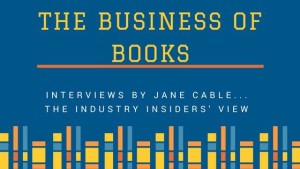What was the first publishing business advice you were given?
Be clear and be on time. There’s the myth of the maverick writer who delays and delays only to appear at the eleventh hour with a work of genius. Editors can’t do that. The role of the editor is to make a piece of writing the best piece of writing it can be. That can mean anything from a little judicious rephrasing here and there to hitting the alarm bell when a character inexplicably undergoes a personality change halfway through a novel. Editing is primarily a support role. Yes, it takes a lot of skill and yes, a good reputation will make for an excellent career. However, you’re not the star, the writer is. Editing someone else’s book is not an opportunity to rewrite it in your own writerly image. Respect their style and adapt your approach accordingly.
By being clear, I mean when the writer received their edited manuscript from you, the only queries should be regarding the suggestions you have made. It is fine if they disagree or want to challenge, but you should be concerned if they have to ask you to explain yourself. Again, you’re there for support. Don’t be cryptic, be helpful, encouraging and reassuring.
 What was the most recent piece of publishing advice you gave or received?
What was the most recent piece of publishing advice you gave or received?
I did a lot of academic proof-editing for German clients when I lived in Bonn. More often than not I’d have to go back to them and ask, “UK or US English?” A lot of the time, they wouldn’t know. I had a young client was writing an article on the Nuremberg trials for publication in England so I contacted the publisher directly and asked for their house style. My advice to him, at the beginning of his academic career, was always to ask the publisher or publication for which he is writing for a copy of their house-style. Most have them and failing to follow it can mean instant rejection or, if you’re lucky, a lot of extra work within a very short space of time. No editor, however brilliant, can save you if you overlook that piece of advice. Make life easier for yourself and make sure you get it right from the start.
What is the piece of advice you’d most like to pass on?
Graham Norton asked Michael Morpurgo the same question in an interview a couple of days ago. Michael’s response; “Live an interesting life”. That’s got to be my answer too. It seems to me that, at this point in time, there’s a lot of emphasis on academic qualifications in creative writing. Agents are even starting to ask for that information in submissions. I feel very uneasy about that; I think it’s the wrong route for the publishing industry to take but that’s another article! For me, writing comes from within and it needs to be fed from within.
So my advice would be; don’t rush to be the ingénue novelist who has known nothing but the inside of a university lecture hall. OK, you’ll look good in the publicity photos and the press will adore you for the full fifteen minutes, but what experiences are you drawing on. What are you really giving the reader, and therefore the world? Go out and live your life, meet people and challenge yourself. No matter if you want to write medieval crime thrillers or contemporary romance; stories are about people and people are the key to stories; even in their absence, there’s a story. You won’t learn about people in a classroom. Get out there, but take your notebook.
J L Dean is an a freelance editor and historical novelist, recently returned from three years living in Germany, she divides her time between work, law studies and that difficult second novel.

